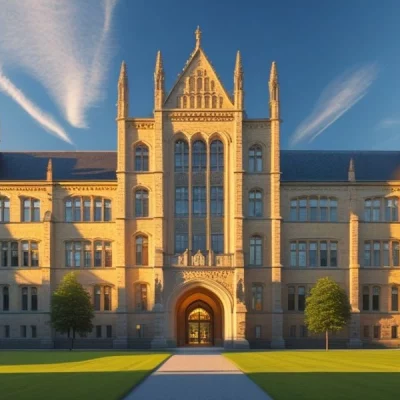Top Universities and Colleges in Switzerland in 2025
Table of Contents
Switzerland is home to some of the best universities in the world, offering high-quality education, and strong global connections. Studying in Switzerland also means affordable tuition fees compared to other top-ranked universities and the chance to learn in multiple languages—English, French, German, and Italian. With a diverse student community, strong career prospects, and partnerships with multinational companies and global organizations, Swiss universities provide an unmatched learning experience. Below, we explore Switzerland’s top universities in 2025, covering their rankings, programs, tuition fees, and unique features to help you choose the best fit for your academic and career goals.
Top Universities in Switzerland
ETH Zurich (Swiss Federal Institute of Technology)
If you’re passionate about science, engineering, and cutting-edge research, then ETH Zurich is the place to be. Established in 1855, this prestigious university has built a reputation as one of the world’s leading institutions for technology and the natural sciences. ETH Zurich has produced 22 Nobel Prize winners, including the legendary Albert Einstein. Beyond academics, ETH Zurich fosters a vibrant international community, with students and faculty from over 120 countries, ensuring a diverse and stimulating educational experience. The university’s strong ties to global companies such as Google, IBM, and Siemens provide students with unmatched internship and career opportunities. Below are the key highlights of ETH Zurich (Swiss Federal Institute of Technology):
| Feature | Details |
| Ranking (2025) | 7th globally. |
| Acceptance Rate | Approximately 27%. |
| Campuses | Main campus in Zurich. |
| Established Year | 1855. |
| Male-to-Female Ratio | Approximately 66.7% male to 33.3% female. |
| Popular Courses | Engineering, Computer Science, Natural Sciences, Architecture. |
| Tuition Fees for International Students | CHF 1,298 per year. |
| Scholarships | Offers various scholarships, including the Excellence Scholarship & Opportunity Programme. |
| Admission Requirements | High school diploma with excellent grades, proficiency in German and/or English (depending on the program), and standardized test scores as required. |
Ecole Polytechnique Fédérale de Lausanne
Imagine studying at a university that sits along the shores of Lake Geneva. That’s what Ecole Polytechnique Fédérale de Lausanne (EPFL) offers its students. Founded in 1969, EPFL is one of the most prestigious technical universities in Europe, attracting some of the brightest engineers, scientists, and entrepreneurs from across the world. EPFL is particularly well known for its breakthrough research in artificial intelligence, robotics, biomedical engineering, and sustainable energy. It has produced some of the most impactful research in machine learning, neuroscience, and space technology, often collaborating with organizations like NASA, CERN, and Tesla. Below are the key highlights of Ecole Polytechnique Fédérale de Lausanne (EPFL):
| Feature | Details |
| Ranking (2025) | 22nd globally |
| Acceptance Rate | Approximately 20%, indicating a competitive admission landscape |
| Campuses | Main campus in Lausanne, with satellite campuses in Neuchâtel, Geneva, and Sion |
| Established Year | 1969 |
| Male-to-Female Ratio | Approximately 71% male to 29% female, with ongoing initiatives to balance the ratio |
| Popular Courses | Computer Science, Engineering, Life Sciences, and Architecture |
| Tuition Fees for International Students | Around CHF 1,266 per year, offering excellent value for a top-tier education |
| Scholarships | Provides a range of scholarships, including the EPFL Excellence Fellowships |
| Admission Requirements | Secondary school diploma, proficiency in French and/or English, motivation letter, and recommendation letters |
University of Zurich
If you’re looking for a world-class education in a busy metropolitan city, the University of Zurich (UZH) is an ideal choice. Established in 1833, UZH is Switzerland’s largest and most comprehensive university, offering programs in medicine, law, economics, social sciences, and more. UZH is home to over 26,000 students, making it one of Europe’s largest universities. Its faculty includes renowned professors and Nobel Prize-winning researchers, particularly in the fields of medicine and economics. A major strength of UZH is its research-driven approach, making it a leader in fields like genetics, finance, and international law. Below are the key highlights of University of Zurich:
| Feature | Details |
| Ranking (2025) | 78th globally |
| Acceptance Rate | Approximately 56%, offering accessible education opportunities |
| Campuses | Multiple campuses across Zurich, including Irchel, City, and Oerlikon |
| Established Year | 1833 |
| Male-to-Female Ratio | Approximately 44% male to 56% female, promoting gender inclusivity |
| Popular Courses | Medicine, Law, Economics, and Social Sciences |
| Tuition Fees for International Students | Around CHF 1,280 per year, maintaining affordability for quality education |
| Scholarships | Offers various scholarships, including those based on merit and financial need |
| Admission Requirements | Recognized secondary education diploma, language proficiency in German and/or English, and relevant standardized test scores |
University of Lausanne
Founded in 1537 as a school of Protestant theology, the University of Lausanne (UNIL) has transformed over the centuries into a comprehensive institution. Today, UNIL is home to over 15,000 students and 3,000 researchers, creating a dynamic environment where diverse fields meet. UNIL’s main campus in Dorigny, Lausanne, offers a serene yet stimulating setting for academic pursuits. The university is particularly known for its programs in Business, Humanities, Environmental Sciences, and Law. Its commitment to research is evident through more than 190 research units working in fields as varied as genomics, cinema aesthetics, and environmental law. Below are the key highlights of University of Lausanne:
| Feature | Details |
| Ranking (2025) | Tied at 149th globally. |
| Acceptance Rate | Approximately 64%, reflecting a moderately selective admission process. |
| Campuses | Main campus in Dorigny, Lausanne. |
| Established Year | 1537. |
| Male-to-Female Ratio | Approximately 45% male to 55% female, fostering a balanced academic environment. |
| Popular Courses | Business, Humanities, Environmental Sciences, and Law. |
| Tuition Fees for International Students | Around CHF 1,160 per year, ensuring accessibility for students worldwide. |
| Scholarships | Provides scholarships such as the UNIL Master’s Grants. |
| Admission Requirements | Secondary education diploma, proficiency in French and/or English, and specific program prerequisites. |
University of Geneva
Imagine studying in a city known for diplomacy and international collaboration. Founded in 1559 by John Calvin, the University of Geneva (UNIGE) started as a theological seminary but has since grown into one of Switzerland’s most respected public research universities. Because of its close ties to international Geneva, students have the unique opportunity to engage with diplomats, policymakers, and researchers who work in major organizations like the United Nations, World Health Organization, and the World Trade Organization. With its commitment to academic excellence, UNIGE is ranked among the top 100 universities worldwide. Below are the key highlights of University of Geneva (UNIGE):
| Feature | Details |
| Ranking (2025) | 108th globally |
| Acceptance Rate | Approximately 59%, making admissions competitive but accessible |
| Campuses | Main campus in Geneva, with additional facilities across the city |
| Established Year | 1559 |
| Male-to-Female Ratio | Approximately 46% male to 54% female, supporting gender diversity |
| Popular Courses | International Relations, Law, Sciences, and Humanities |
| Tuition Fees for International Students | Around CHF 1,000 per year, making it one of the most affordable universities in Switzerland |
| Scholarships | Offers various scholarships to support international students |
| Admission Requirements | High school diploma, proficiency in French and/or English, and specific program prerequisites |
Conclusion
Switzerland offers world-class education with top-ranked universities, strong industry connections, and affordable tuition fees. Whether you’re looking for a research-intensive institution, career-focused education, or international opportunities, Swiss universities provide a variety of options to suit different academic goals.
- If you’re passionate about engineering and technology, ETH Zurich and EPFL are globally recognized for their top-tier research and innovation.
- For students interested in medicine, law, or business, the University of Zurich offers comprehensive academic experience.
- If interdisciplinary research, environmental sciences, or humanities appeal to you, the University of Lausanne is an excellent option.
- For those drawn to diplomacy, global relations, and international law, the University of Geneva offers unparalleled networking and career opportunities.
No matter which university you choose, studying in Switzerland means a top-quality education, global exposure, and excellent career prospects.
Frequently Asked Questions
What are the best universities in Switzerland for international students?
Some of the top universities in Switzerland include:
- ETH Zurich – Best for engineering, technology, and sciences.
- Ecole Polytechnique Fédérale de Lausanne (EPFL) – Known for research and innovation in artificial intelligence, robotics, and sustainability.
- University of Zurich – Ideal for medicine, law, and economics.
- University of Lausanne – Excellent for business, environmental sciences, and humanities.
- University of Geneva – Best for international relations, diplomacy, and global law.
What is the cost of studying in Switzerland?
Switzerland offers affordable tuition fees compared to other top universities in Europe and the US. Here’s an overview of annual tuition fees for international students at the top universities:
- ETH Zurich – CHF 1,298
- EPFL – CHF 1,266
- University of Zurich – CHF 1,280
- University of Lausanne – CHF 1,160
- University of Geneva – CHF 1,000
However, living costs (accommodation, food, transportation) can range between CHF 1,500 - CHF 2,500 per month, depending on the city.
Are there scholarships for international students in Switzerland?
Yes, Swiss universities offer various scholarships and financial aid programs to support international students. Some popular ones include:
- ETH Zurich Excellence Scholarship & Opportunity Programme
- EPFL Excellence Fellowships
- University of Lausanne Master's Grants
- Swiss Government Excellence Scholarships
What are the admission requirements for Swiss universities?
Admission requirements at Swiss universities vary by university and program, but generally include:
- A recognized high school diploma or equivalent
- Proof of language proficiency (German, French, or English depending on the program)
- Motivation letter or personal statement
- Recommendation letters (for certain master's and PhD programs)
- Standardized test scores (SAT, GRE, GMAT may be required for some programs)
What languages are used for instruction in Swiss universities?
Swiss universities offer programs in multiple languages, including:
- German – Mainly used at ETH Zurich and University of Zurich.
- French – Used at EPFL, University of Lausanne, and University of Geneva.
- English – Many master’s and PhD programs are taught in English to accommodate international students.







